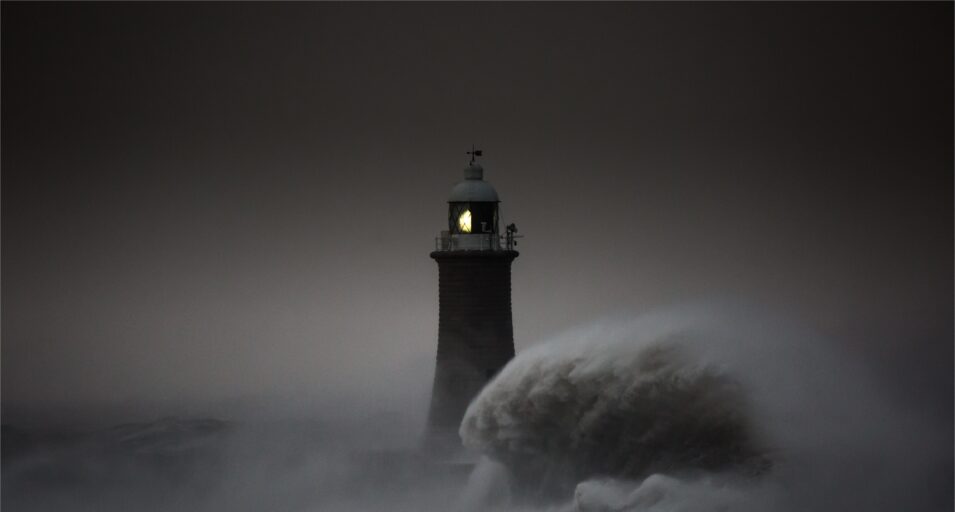
When Chester falls from the lighthouse, his mind is blank. He does not think about the boy who pushed him. He does not see his life in technicolor. There is only the familiar falling, caught in an unforgiving wind, ocean spray finding its way into his lungs before he’s anywhere near the ground.
It’s a long fall, as these things go. The storm leaves him to it, only contributing the winds and a smattering of fresh water from above to balance out the brine from below.
A third of the way down, however, time seems to slow. Chester registers an ashen face peering down at him from the balcony overhead. The storm quiets. The waves grow still.
No, not quite still. Just moving much more slowly. Chester, too, feels the air compress and congeal around his chest. Now he falls through gelid molasses rather than icy fluid.
A wildflower blooms in his mind, pink and radiant against the gray of the sky and the sea and the face looking down at him. Something to fill the emptiness.
This is what makes Chester wonder, for the first time, whether he’s really dreaming. Every keeper preceding him has written of the same dream. The falling, the face, the slowing, the impact that never comes. This is familiar to Chester.
The flower is not, and fear blooms along with it.
The face above him smiles, and its accompanying voice adds more fused petals to the flower in Chester’s mind. “Do you like it?”
Chester’s breath catches in his chest. He stares at the face of the boy high above, realizing suddenly that he recognizes the eyes, the nose, the dimpled cheeks. “Yes,” he whispers. “You know I do.”
“But it’s not to be touched,” the boy replies. His voice sounds in Chester’s ear, as though they were falling alongside one another. A voice clumsy and scratchy with oncoming change.
Chester is halfway down the lighthouse. “No.” The wind seems to rip the words from his lips. “It’s poison. Foxglove. You know that.”
The flower in his mind grows a stem. Leaves follow. When the roots begin to stretch from the base of the plant, now complete, Chester is overcome. He can see into the windows of the lighthouse, see two pairs of feet running up the steps before rushing back down, bouquets of deadly blossoms clutched in each hand.
“But how can something so pretty,” asks the boy, “be such a terrible thing?”
Chester’s hand brushes across the crest of a wave. Not long, now. But he reminds himself that it’s only a dream. It must be, for the boy and the flowers are long dead.
“Chester,” the boy calls. “You never answered my question.”
No, he hadn’t. And when Chester had found the boy with petals on his lips, still he had remained silent. All those years ago, two boys lost in the meadow.
A pretty thing. Not to be touched.
Chester observes through another window the newfound pain of solitude, his swollen joints creaking up the stairs. The journey he has come to despise over the many years spent tending the lighthouse and its tiny island. Alone.
But what can he do?
As if in answer, the boy calls, “Don’t wake up, Chester.”
A dream in truth, then? Chester wonders, his mind tangled in the decision between fantasy and fate.
“It’s been so long, Chester, don’t you think you’ve punished yourself enough?”
The words hold a dangerous seed of truth. A glance downward tells Chester he’ll hit the rocks, not the water. He reaches out once more to sluice his fingertips through a rising wave positioned to pound the lighthouse wall. In the boy’s eyes there is a question, words coming to Chester through the silent storm. Will he awaken on impact, as he has each night before?
Does he want to?
The flower in his mind quivers, accruing a smattering of morning dew. The boy’s voice sounds once more, a whisper in Chester’s ear. “We can tend the flowers in the meadow, like we did when we were young.”
One more glance through the slotted window on the lighthouse door. The stairs wind ever upward, lit with a warm kerosene glow. The meadow, Chester muses to himself, as the lamps brighten in mimicry of distant sunlight.
He does not see the bell-shaped blossoms growing stoically from a crack in the rocks.
Maddox Emory Arnold (he/they) is a writer and educator based in Southeast Michigan. His words can be found in If There's Anyone Left, HAD, NonBinary Review, Flame Tree Press' Sun Rising Collection, and elsewhere. You can find him on Twitter @maddox_emory
